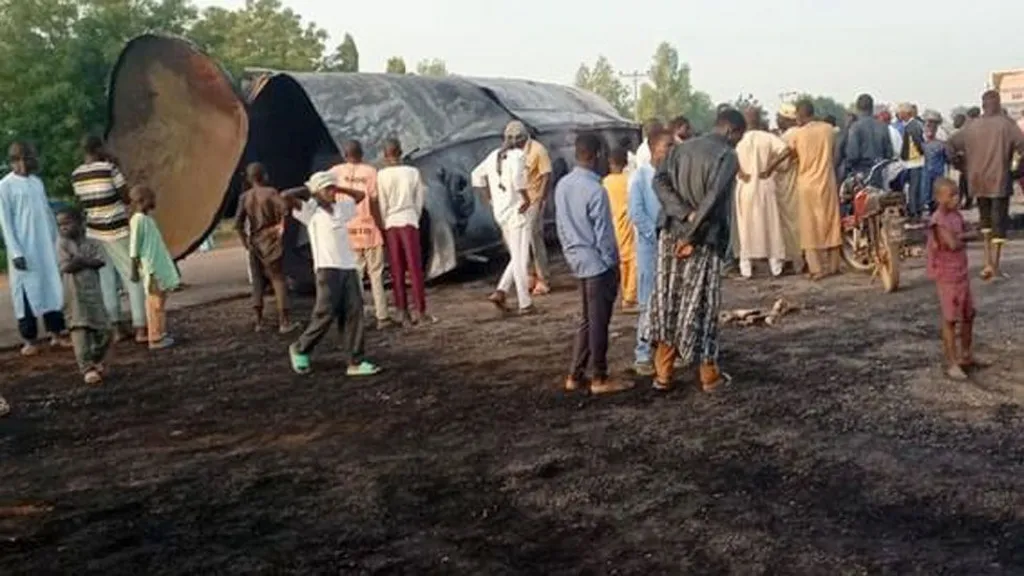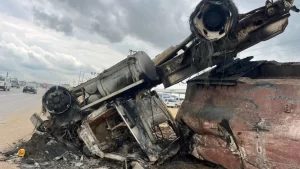Tragedy Strikes Nigeria as Fuel Tanker Explosion Claims 153 Lives
3 min read

A catastrophic incident in northern Nigeria has left at least 153 people dead following the explosion of an overturned fuel tanker. The tragedy occurred on Tuesday night in Jigawa state, where crowds flocked to the scene to collect leaking petrol after the accident.
According to officials, the tanker had been cordoned off by police after it crashed, but the growing crowd proved difficult to manage. Police spokesman Lawal Shiisu Adam explained, “We tried our best to stop people from approaching the vehicle to get petrol, but despite cordoning off the area, we were overpowered. As people were scooping fuel, a fire erupted.” The incident unfolded in the town of Majia around 11:30 PM local time (10:30 PM GMT).
The fuel tanker was en route from Kano to Nguru in Yobe state when the driver reportedly lost control of the vehicle. Fortunately, the driver emerged unscathed and has since been taken into custody as authorities investigate the circumstances surrounding the crash.
Vice-President Kashim Shettima extended condolences to the victims’ families and called for a thorough review of fuel transportation safety protocols across Nigeria. The incident highlights ongoing concerns regarding safety in the transportation of hazardous materials, especially given the country’s history of similar tragedies.
As emergency services rushed to the scene, many victims were found burnt beyond recognition, necessitating the covering of bodies with tree branches to shield them from public view. Rescue workers continue to recover bodies, with some discovered far from the crash site, suggesting that victims may have attempted to seek help before succumbing to their injuries. Most of the deceased have been buried in a mass ceremony, reflecting the scale of the loss.
The aftermath of the explosion has prompted outrage and grief across the region. Disturbing videos circulating on social media captured the chaos that ensued as the fire spread. Many of the injured have been taken to local hospitals, with several in critical condition.
Fuel tanker accidents are unfortunately common in Nigeria, often attributed to poor road conditions and inadequate vehicle maintenance. This latest tragedy is reminiscent of previous incidents, including a September collision in Niger state that claimed the lives of 59 individuals when a fuel tanker collided with a lorry transporting passengers and livestock.

In a related incident, another fuel tanker overturned in Ogun state on Wednesday morning, spilling petrol and igniting flames that ravaged the area, damaging nearby vehicles. Thankfully, no injuries were reported, but the incident caused significant financial damage.
Authorities face increasing pressure to address the safety risks associated with fuel transportation in Nigeria. The combination of poorly maintained roads, aging vehicles, and a lack of enforcement of safety regulations has created a precarious environment for both drivers and pedestrians.
As the nation mourns the tragic loss of life, calls for reform and better safety protocols have intensified. Many citizens are demanding that the government take decisive action to prevent future disasters, emphasizing the need for stricter regulations governing the transportation of hazardous materials.
This tragedy serves as a stark reminder of the dangers associated with fuel transportation in Nigeria and the urgent need for comprehensive safety measures to protect the lives of those who navigate the country’s roadways. The government’s response and commitment to enhancing safety protocols will be crucial in the wake of this devastating event, as families and communities come to terms with their profound loss.